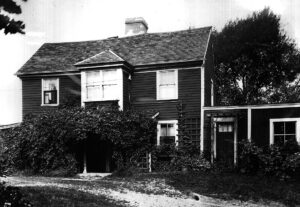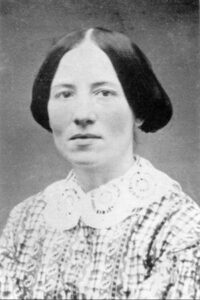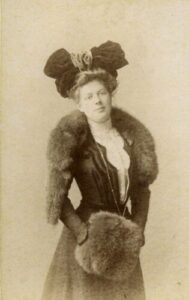For Women’s History Month – March, 2022
Marblehead Women in History
By Pam Peterson, Historian and MFHS Secretary
From the beginning, women in Marblehead were strong, self-reliant, and often enterprising. Functioning in what was, in essence, an industrial community; a commercial fishing seaport that welcomed vessels from many ports of call, women needed to work hard. A large percentage of men were often away at sea for long periods of time, so they developed a resilience and even toughness that was necessary in early rural America.
In this environment, there was a variety and abundance of work needed to support fishing and then the shoe industry, and to keep households operating in the absence of the men. Beginning at around the age of eight or so, boys, and their fathers and uncles and brothers, went to sea for months at a time, fishing offshore throughout the year, and on the frigid Grand Banks in spring and in fall. They also served on merchant vessels crossing the Atlantic and, later into the Pacific. Some women ran taverns, and some worked at trades while their husbands were away at sea, or at war, or dead. They were part of the shore-based support industries of fishing, or they labored at piecework, shoe-making in their homes for additional income or as their sole means of support. Marblehead women were hard workers as well as prolific and dedicated mothers.
Throughout their lives, Marblehead women endured unspeakable losses, as fathers, brothers, husbands, and sons were lost at sea or perished on distant shores from disease, accident, or maritime warfare, never to return again. Many an entry in Marblehead death records reads “fell off a mast,” “drowned off (some faraway place),” “died of (some exotic and/or debilitating disease)” contracted in foreign lands or on unsanitary ships. While many women married several times, others remained widows, often relying on their community for support. In the 1800s, those who lived to old age often died “in the poorhouse.” It was this significant social need that impelled women’s groups and churches to offer relief funds. Social welfare organizations such as the Marblehead Female Humane Society (1816) were established very early on in Marblehead.
Most women were part of the sisterhood of community support that has persisted throughout time, helping less fortunate neighbors and friends as much as possible. Some women made distinct contributions to social welfare, religious and academic developments, or the socio-cultural vitality of the town. In one way or another, all contributed to the nurturing of the Marblehead community. This spirit of involvement for the betterment of the community is alive today, in the many social, health-related, and cultural groups, including the still active MFHS, that thrive in Marblehead.
Lucretia Brown (“Aunt ‘Crese”) was the wife of black Revolutionary War veteran Joseph Brown, who won his freedom by fighting in the war. Together, they operated a tavern beside the pond on Gingerbread Hill, where Election Day celebrations were held, with spirits and ‘Lection buns consumed in great quantity. Lucretia was famous for her “Joe Frogger” molasses cakes (or cookies), which continue to be popular today.

Agnes Surriage was an 18th c. fisherman’s daughter who worked in John Bartlett’s tavern, the Fountain Inn, high on a headland (Bailey’s Head) overlooking Little Harbor. In 1742, she captured the attention of an English nobleman and customs official, and became his mistress. He finally married her after a 1755 earthquake in Lisbon, Portugal, when she rescued him and saved his life. She died in England in 1783.
Mary Alley was a Marblehead school teacher in the late 1800s. She was highly aware of the problems and illnesses of

townspeople. She bought medicines and food to needy individuals, and co-founded the Marblehead Visiting Nurse Association in 1895. She served on the Board of the Marblehead Female Humane Society. She donated her home on Franklin Street to be a hospital. In the 1920s, the Mary Alley Hospital opened, and continued in service until the mid-1960s.
Marcia Selman studied at the Marblehead Academy on Pleasant Street, She was an active participant in the North Shore temperance movement, the fight for women’s right to vote, and eventually pursued her early dream of becoming a minister, serving as minister of the Unitarian Church in Marblehead. She wrote a temperance song, Marblehead Forever, which became the town anthem in the 1900s.

Louise DuPont Crowninshield (b.1877 – d. 1958) was a summer resident of Marblehead. Mrs. Crowninshield attended St. Michael’s Church, and supported many charities. With her innate sense of taste, and knowledge of antiques, she was a strong voice for the colonial Revival movement of the 20th century. She established the National Trust for the Preservation of Historic Homes. In Marblehead, she supported the Lee Mansion with many gifts of colonial American furnishings.
